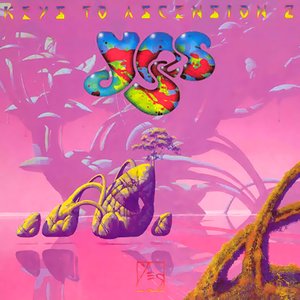Published on Oct 21, 1998
Leave it to Yes to put out two double albums in a row (
Keys To Ascension and
Keys To Ascension 2) that feature one disc of live “greatest
hits”-type tracks and another of brand-new studio material. After
all, what band has better captured the concept of duality — yin
and yang, chaos and order, profound prog-rock and pasteurized pop
— in its now 30-year career?
Settle down, it’s a rhetorical question.
KTA 2 is the second in a pair that captures both live and
studio tracks from the “classic Yes” reunion of 1995-96, which
brought together for the first time since the late 1970s the lineup
of Jon Anderson (vocals), Steve Howe (guitar), Chris Squire (bass
and harmony vocals), Rick Wakeman (keyboards) and Alan White
(drums). Given that this is the line-up that created one of the
all-time great live albums (Yessongs) and one of my personal
favorite Yes studio albums (
Going For the One), when this album came out in October ’97,
my expectations were high. I was not disappointed.
Not that the live tracks are any real revelation. “I’ve Seen All
Good People,” “Close to the Edge” and “And You and I” have each
been featured on multiple prior live albums. Still, it is
reassuring to hear that the band doesn’t seem to have lost a step
in recreating these complex pieces — especially the vivid, intense
“Edge,” the band’s signature 20-minute opus.
What’s more of a treat is getting a rearranged rendition of
“Time and a Word,” an early tune that shows off the band’s folk
roots, here augmented with a very pretty piano intro by Wakeman.
And “Turn of the Century” reveals here why it is one of the band’s
most-loved album cuts, as Howe carries the song with his exquisite
classical guitar playing until, at the climax, he moves seamlessly
into a series of gorgeous electric trills, every note sweet and
perfect.
The true revelation here, though, is the studio tracks.
The first
KTA‘s two studio tracks harkened back to the early years in
length (one clocking at 19 minutes and the other at 10), but the
songs didn’t feel well thought-out; more like a quickly-assembled
melange of decent ideas that could have matured into something
memorable with more time.
Apparently they were just getting warmed up on the first
KTA, though, because
KTA 2‘s studio tracks constitute the best new material Yes
has recorded in 20 years.
The opener, “Mind Drive,” bears all the hallmarks of the epic
Yes style, with its distinct movements and multiple variations on
the same melodic themes. Howe’s soft, precise acoustic prelude
segues surprisingly smoothly into a thunderous Squire/White
bass/drum theme that allows the other players opportunity after
opportunity to elaborate on and then return to it over the course
of the song’s 18-minute girth. In less-than-stellar players’ hands,
this would likely end in disaster — repetition and boredom. But
when you put together four musicians with the world-class chops and
creative interplay of Howe, Squire, White and Wakeman, it qualifies
as near-nirvana. Here, the classical-style cycling and restating of
musical themes in a rock context works the old Yes magic like 1977
was yesterday.
The best news of all, though, is without a doubt that, on this
album, Chris Squire is back, his Rickenbacker bass awakened like
Rip Van Winkle from fifteen years of burial under former Yes
guitarist/producer Trevor Rabin’s musical dominance of the band.
Squire’s playing on all four new vocal tunes here is everything you
remembered and missed from classic Yes tunes like “Roundabout” —
brimming with aggressive riffs, ingenious time changes and full-on
musical bravado.
On the ringing “Footprints,” Squire carries the melody for the
first minute, and the entire rest of the song is built off his
complex, bouncy line. His driving, urgent line opening “Bring Me to
the Power” has much the same function and effect.
Not that Howe and Wakeman don’t get their licks in; Howe in
particular plants a unimaginably nimble solo or two along the way
in almost every song and, much like Squire, sounds thoroughly
reinvigorated by their renewed musical partnership. Anderson is,
well, Anderson — airy and full of well-intentioned new age
pronouncements that almost make sense, but always right with the
music, a unique and memorable vocal sound painter.
Unfortunately — as seems almost characteristic of this band —
all this good news comes with a catch. As Yes was working to get
KTA 2 ready for distribution, a rift developed between
Wakeman and the rest of the band, and he ended up leaving. (For, I
might add, the fourth time.
Days of Our Lives has nothing over this band when it comes
to melodramatic plot twists…) So, after producing the best music
they had in two decades, Yes went through yet another transition,
emerging with its current Wakeman-less line-up and rushed, poppish,
inferior
Open Your Eyes album.
Word from the Yes camp is that the album they will go into the
studio to record early next year will once again hark back to the
longer form successfully revived on
KTA 2. Based on this album, you can only hope the pendulum
swings back yet again.
